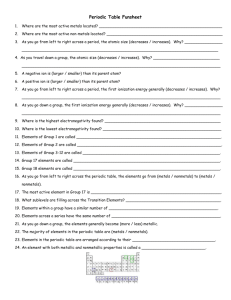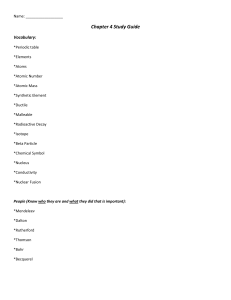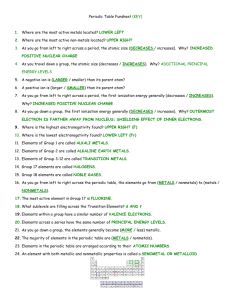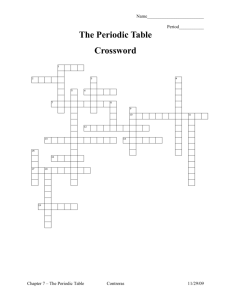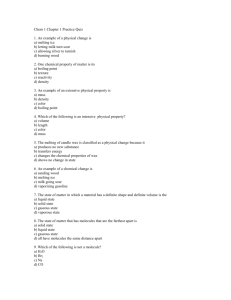Elements
advertisement
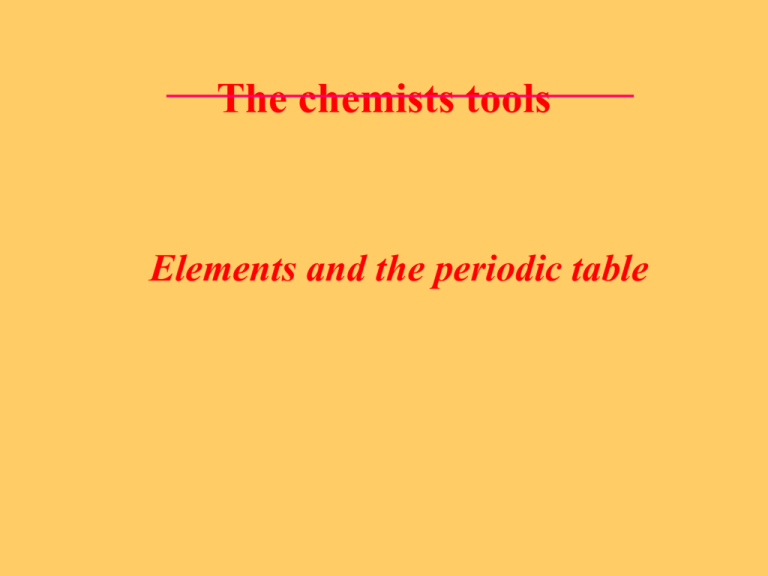
The chemists tools Elements and the periodic table Elements Pure substances that cannot be separated into different substances by ordinary processes Are the building blocks of matter 120 elements known today Examples: carbon gold calcium Symbols of Elements Use 1 or 2 letter abbreviations Capitalise the first letter only Examples: C carbon N nitrogen F fluorine O oxygen Co Ca Br Mg cobalt calcium bromine magnesium Symbols from Latin Names Element Copper Gold Lead Mercury Potassium Silver Sodium Tin Symbol Cu Au Pb Hg K Ag Na Sn Latin name cuprum aurum plumbum hydrargyrum kalium argentum natrium stannum % Major Elements in the Body O 65.0 % K 0.34 C 18.0 S 0.26 H 10.0 Na 0.14 N 3.0 Cl 0.14 Ca 1.4 Fe 0.004 P 1.0 Zn 0.003 Mg 0.50 Trace Elements As, Cr, Co, Cu, F, I, Mn, Mo, Ni, Se, Si, V Learning Check Select the correct symbol for each: A. Calcium 1) C 2) Ca 3) CA B. Sulfur 1) S C. Iron 1) Ir 2) Sl 3) Su 2) FE 3) Fe Solution Select the correct symbol for each: A. Calcium 2) Ca B. Sulfur 1) S C. Iron 3) Fe Learning Check Select the correct name for each: A. N 1) neon 2) nitrogen 3) nickel B. P 1) potassium 2) phlogiston 3) phosphorus C. Ag 1) silver 2) aegean 3) gold Solution Select the correct name for each: A. N 2) nitrogen B. P 3) phosphorus C. Ag 1) silver Periodic Table The periodic table is an arrangement of the elements according to similarities in their chemical and physical properties. Physical Properties The characteristics of a substance that can be observed without changing the substance. Color Size Shape Density Freezing and Boiling Points Odor Groups of Elements Vertical columns on the periodic table Similar physical properties Similar chemical properties Groups on the Periodic Table 1 2 3 4 5 6 7 8 Representative Groups Group 1 Alkali Metals Group 2 Alkaline Earth Metals Group 7 Halogens Group 8 Noble Gases Location of Some Groups 1 A l m k e a t l a i l s 2 A l k a l i n e 3 4 5 6 7 8 H a l o g e n s I n e r t G a s e s Periods on the Periodic Table Horizontal rows from Group 1 to Group 8. Numbered 1, 2, 3, …. Include representative elements and transition elements Periods on the Periodic Table 1 2 3 4 5 6 Learning Check A. Element in Group VIIA, Period 4 1) Br 2) Cl 3) Mn B. Element in Group IIA, Period 3 1) beryllium 2) magnesium 3) boron Solution A. Element in Group 7A, period 4 1) Br B. Element in Group 2A, Period 3 2) magnesium Learning Check A. Element in Group VIIA, period 4 1) Br 2) Cl 3) Mn B. Element in Group IIA, Period 3 1) beryllium 2) magnesium C. Metals in Group IVA 1) Ge, Sn, Pb 2) C, Si 3) boron 3) C, Si, Ge, Sn D. Nonmetals in Group VA 1) As, Sb, Bi 2) N, P, As 3) N, P, As, Sb Solution A. Element in Group VIIA, period 4 1) Br B. Element in Group IIA, Period 3 2) magnesium C. Metals in Group IVA 1) Ge, Sn, Pb D. Nonmetals in Group VA 2) N, P, As Metals and Nonmetals Metals Located to the left of the heavy line Shiny, ductile Good conductors of heat and electricity Nonmetals Located to the right of the heavy line Dull and brittle Poor conductors, good insulators Metals and Nonmetals Transition metals Learning Check Specify metal (1) or nonmetal (2) for each: A. sulphur ____ B. chlorine ____ C. sodium ____ D. iron ____ E. carbon ____ F. silver ____ Solution Specify metal (1) or nonmetal (2) for each: A. sulphur 2 B. chlorine 2 C. sodium 1 D. iron 1 E. carbon 2 F. silver 1 Learning Check Select the correct elements: A. Metals in Group IVA 1) Ge, Sn, Pb 2) C, Si 3) C, Si, Ge, Sn B. Non-metals in Group VA 1) As, Sb, Bi 2) N, P, As 3) N, P, As, Sb Solution A. Metals in Group 4A 1) Ge, Sn, Pb B. Nonmetals in Group 5A 2) N, P, As
